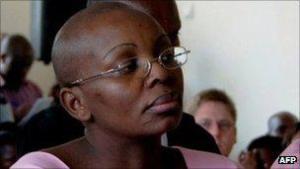
Victoire ngabire, leader of FDU-Inkingi political party returned to Rwanda on January 16th, 2010 from exile. The Rwandan president Paul imprisoned her since October 14th, 2010 for requesting democracy in her country and justice for the hundreds of thousands of Hutus that RPF killed since 1990, during the genocide and after.
This is one of the main conclusions that emerge from the reading of Howard W. French’s article published in The Daily Beast on January 14th, 2013.
Many outsiders to Rwanda can hardly imagine the plight of Hutus who survive under the rule of President Paul Kagame. The main ethnic group with approximately 84% of the whole population has since 1994 been reduced to a social category of sub-humans.
Officially, those Hutus don’t exist as an ethnic group. The Rwandan government led by extremist Tutsis have developed policies to remove any reference to ethnicity outside the genocide narrative where Tutsis are the victims and Hutus the perpetrators.
As a consequence, life in Rwanda is constructed on the basis of victims and perpetrators whenever inside the country there is any conscious or unconscious reference to ethnicity. The authoritatively applied policy and understanding is that there are no Hutus nor Tutsis, but only Rwandans.
Within that loop, the Rwandan political and military leadership finds with some unjust rationalization that not giving to Hutus access to education, employment, health care, property, or even dispossessing them of whatever they own or imprisoning them, killing them becomes justifiable. And it’s not the RPF’s regime that would be contested the fact that it has been applying methodically these practices as government policies.
Quoting Theoneste Rudasingwa, former Tutsi RPF high rank official living in exile, Howard W. French reports him saying that
“When you look at the structure of key parts of government, leadership is occupied almost entirely by Tutsi from the outside, and this is especially true in the military,” Rudasingwa says. “As for the Hutus, they are completely marginalised, and things [for them] have never been as bad as they are today. Almost entire Hutu elite that was built up since 1959 is either outside or dead. They are marginalized and banished, forced into exile when they haven’t been killed.”
And both young Tutsis and Hutus inside Rwanda recognize that marginalization of Hutus. That’s what Cara Meintjes reports about after spending time and talking to people in the country. Firstly, she recalls the views of a disenfranchised young Hutu.
“One day, Eugene (25) confided in me about his struggle for education. His Tutsi school friends who lost family in the genocide are all pursuing their tertiary education on government bursaries, but he, a Hutu, finds his way barred at every turn with administrative difficulties. He considers this deliberate, though unofficial, ethnic discrimination. His family members also died during the genocide, but their deaths are not acknowledged like those of Tutsis, nor does he receive support in overcoming the losses and disruption that his family experienced. He feels overlooked as he struggles to get by.”
When Cara Mentjes turns to a young Tutsi, the young Hutu’s views are confirmed. She explains:
“Later I spoke to Grace (23), a university student. She agrees that Hutus are discriminated against while she, a Tutsi, is favoured by the government. “But that’s only right,” she shrugged. “We Tutsis suffered for a long time.” “Is there justice in Rwanda then?” “No. Not for the opposition parties,” she replied.
Injustices and marginalization are common place for that Hutu community whose present conditions of living don’t seem to indicate that they truly belong to the Rwandan society.
In a recent radio programme on Ijwi Rya Rubanda [a London-based online broadcasting outlet transmitting in Kinyarwanda], a Rwandan Hutu businessman operating in Kigali stated how Kagame’s regime was extorting from them any money they earn in their trade in order to get them out of business. The person seemed to say that policies that the Rwandan government was applying were there to benefit only Tutsis.
Probably, the true picture of the tragedy that the Rwandan president Paul Kagame has caused to his Hutu compatriots will never be known. But what is certain is that it will be felt by many generations of Rwandans to come. The same way the consequences of his militias using rape as a weapon of war in Eastern Congo will.
